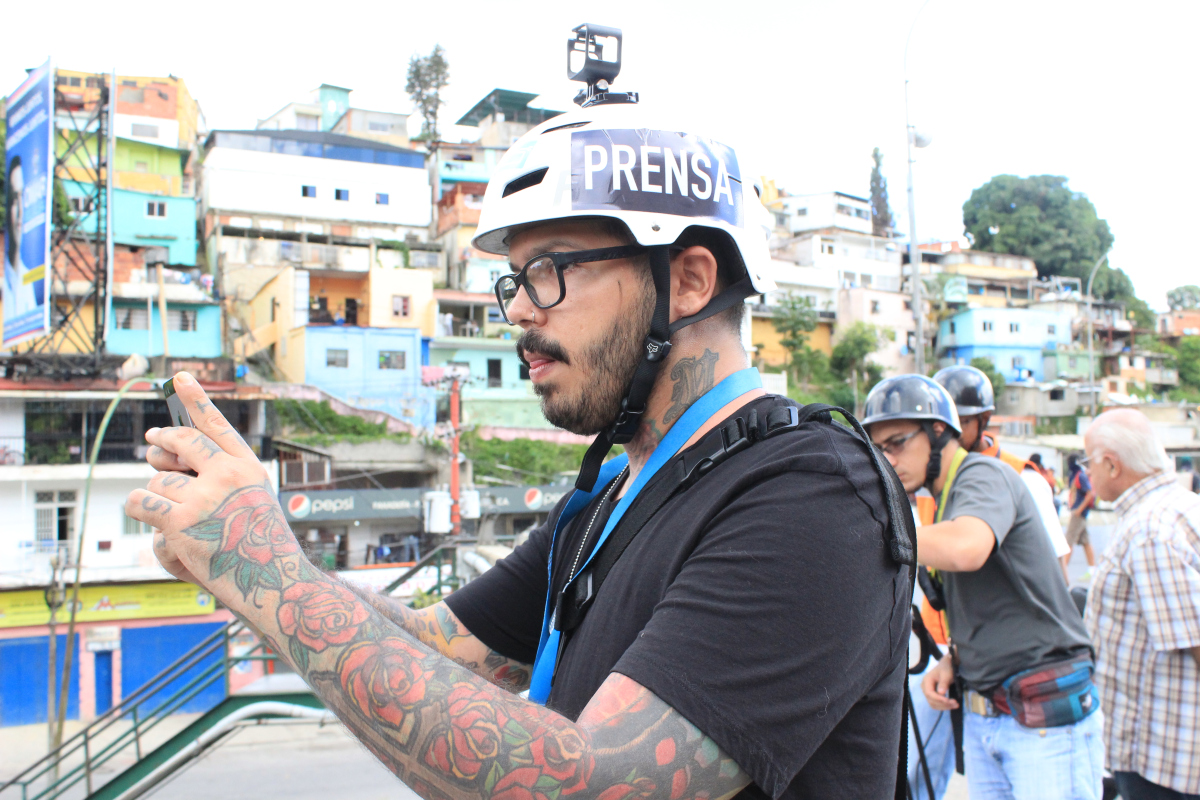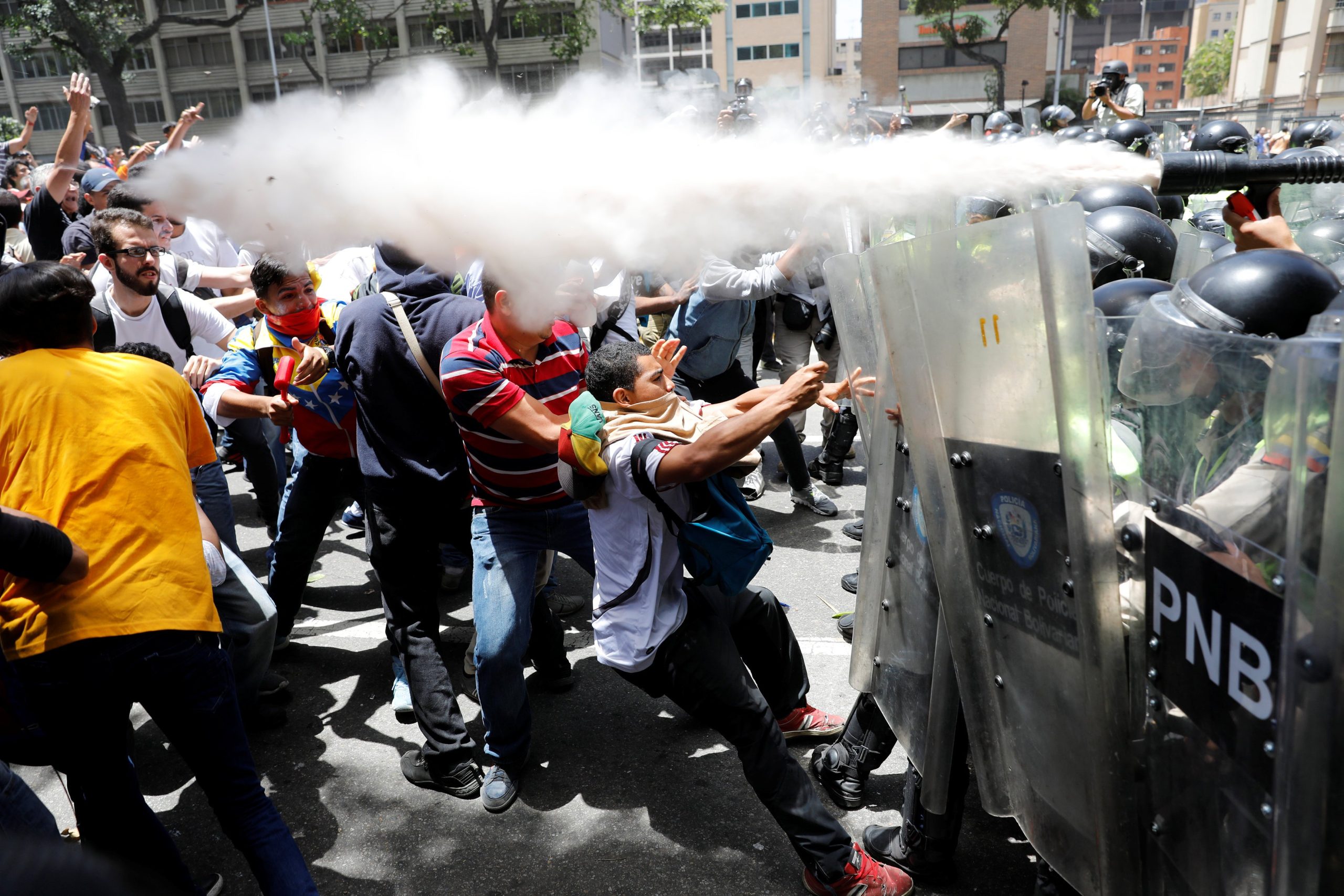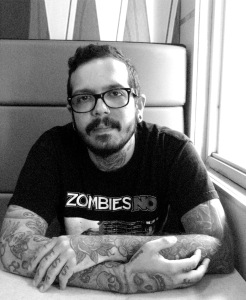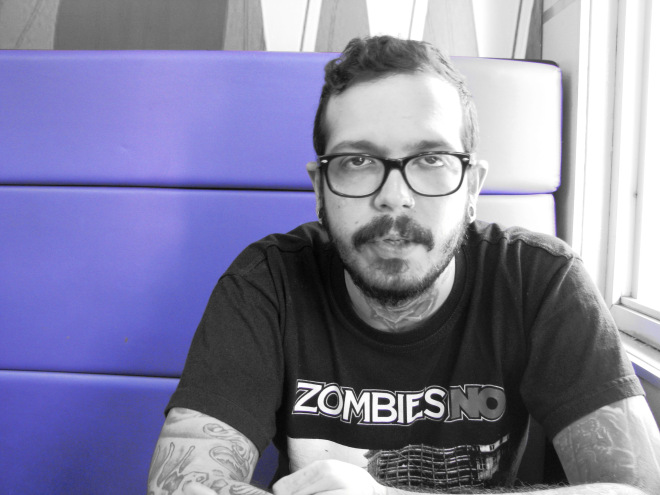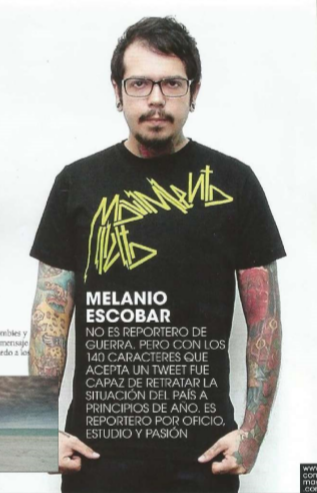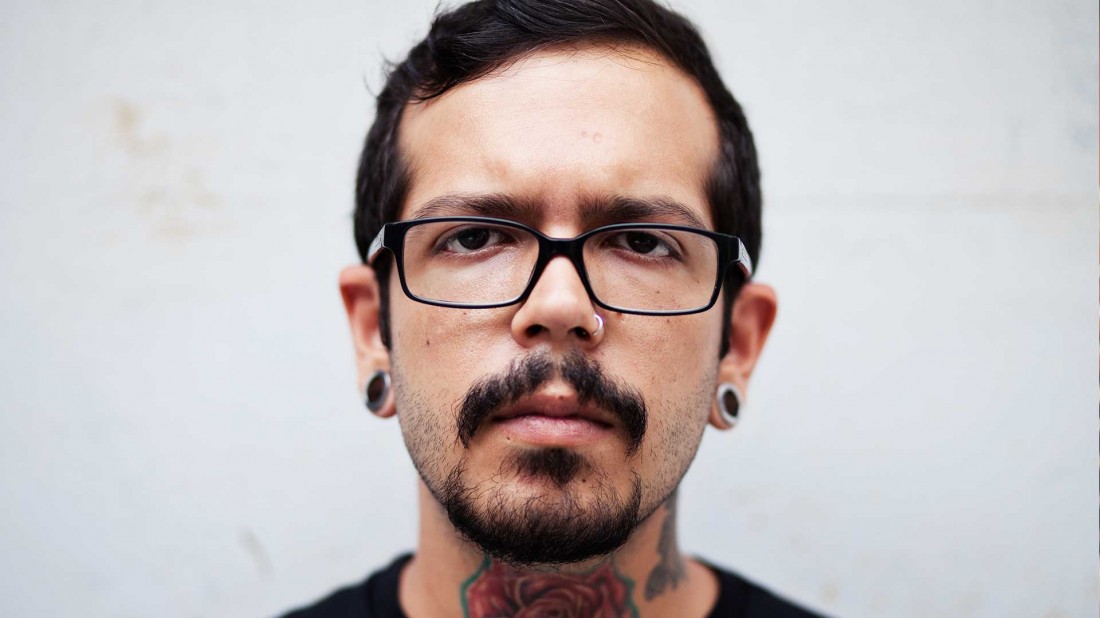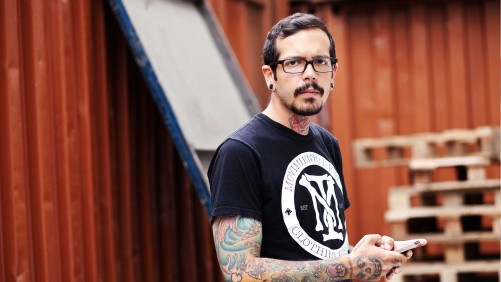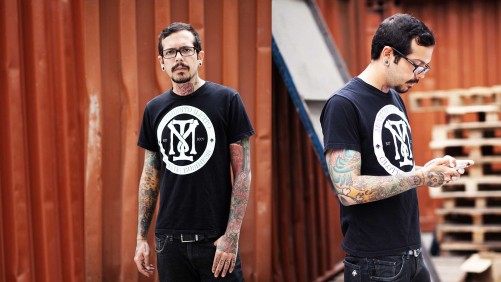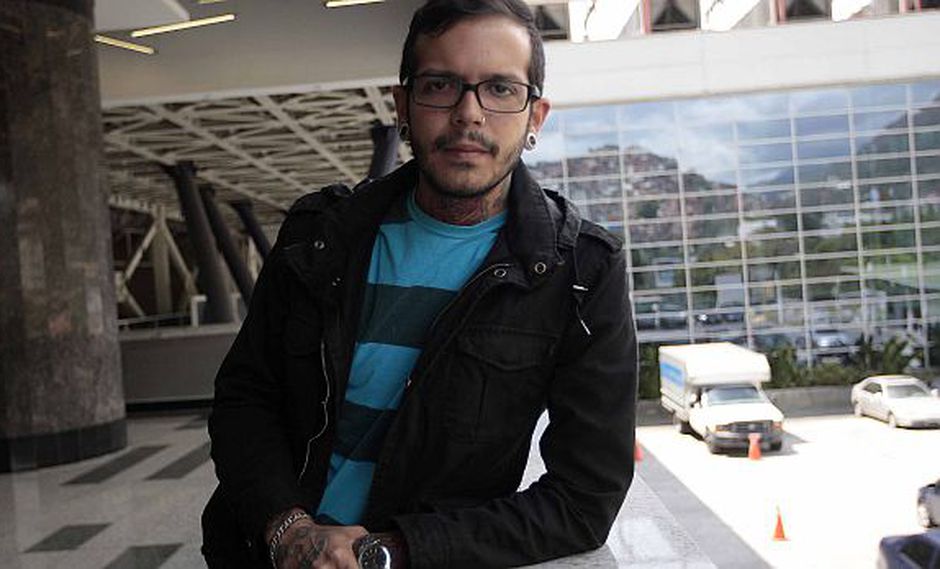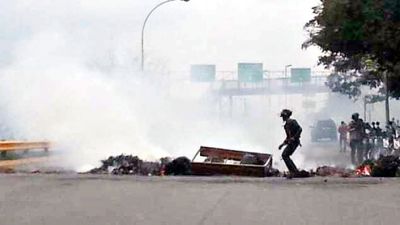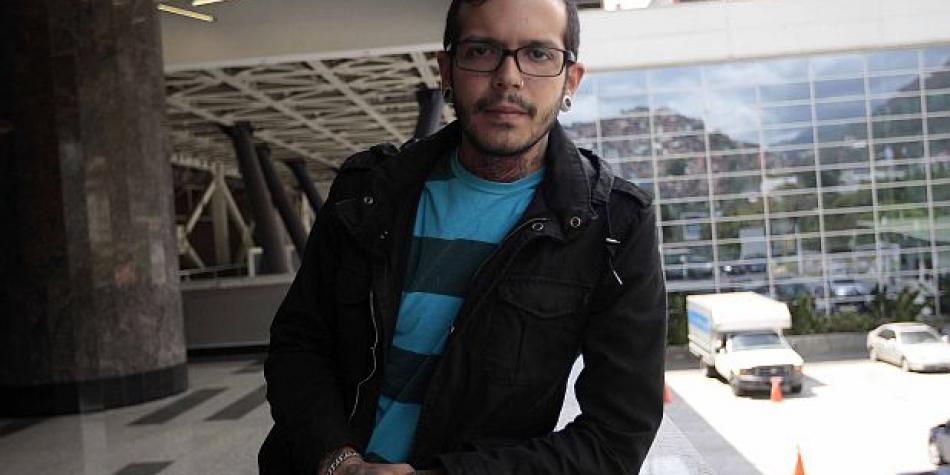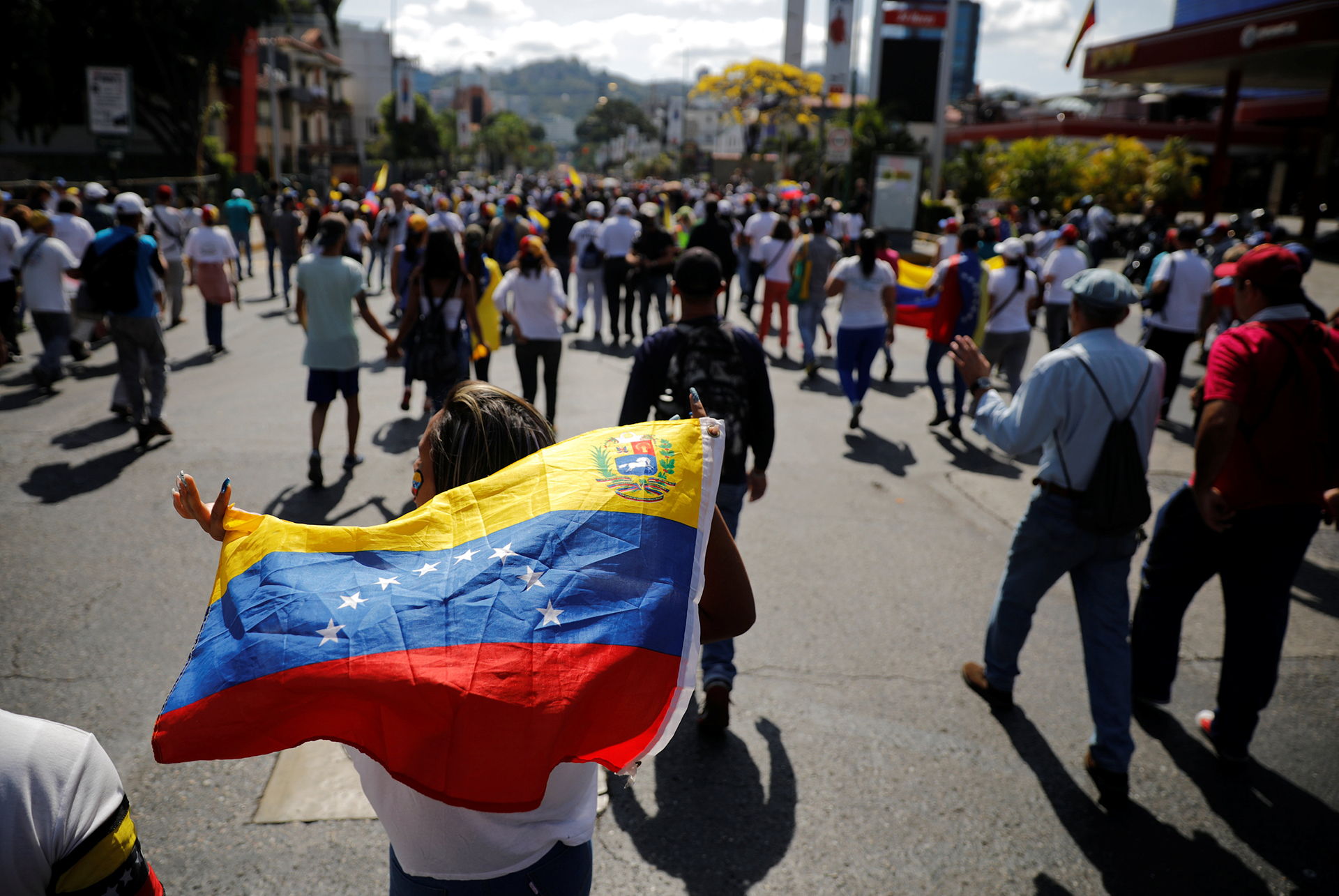How Venezuela’s resistance movement — and the country’s democracy — reached a breaking point during one week in July.
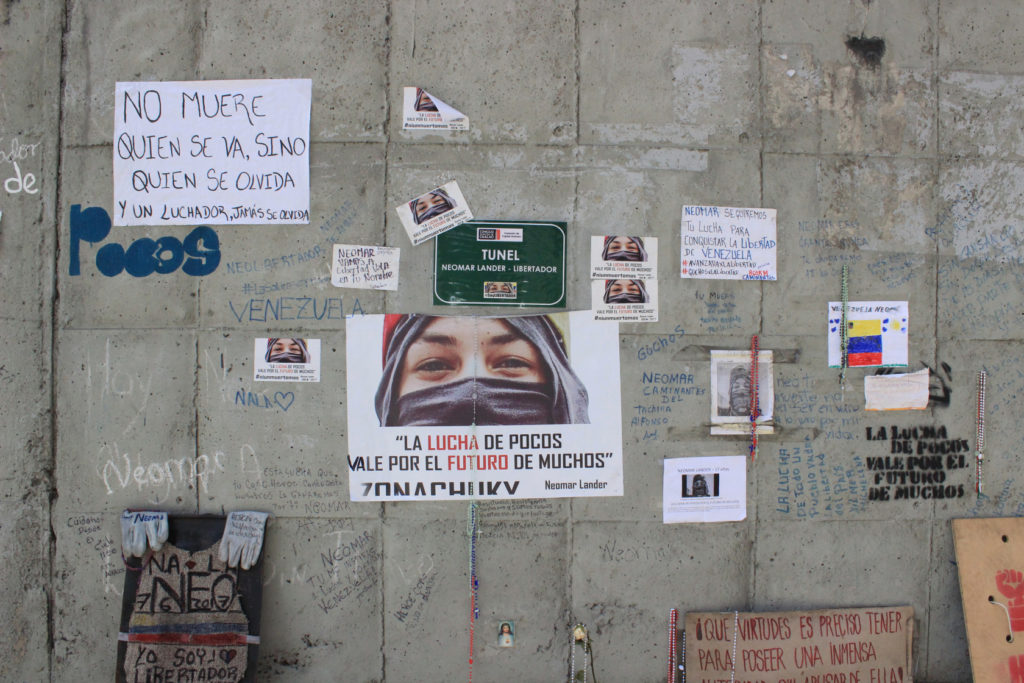
Diego
Recklessly driving through the sloping streets of Caracas, Diego blares “Bonita,” the bass-heavy reggaeton hit of the summer. The stock speakers of his tiny sedan pulsate as we pass block after block of buildings, each cloaked with layers of razor wire and electrified fencing. Diego (whose name, as well as others’, have been changed to protect their identity) laughs and looks at me, smiling cynically, when I ask why it seems like no one bothers to stop at red lights.
“Do you want to be kidnapped or something?”
It’s the night of Thursday, July 27. In less than three days, Venezuelans will live through one of the most defining days in their country’s modern history — and one of the bloodiest. A vote nicknamed the Constituyente is scheduled for July 30. If successful, it would be a major step in president Nicolás Maduro’s march toward dictatorship.
Tonight, the sidewalks are empty and the roads nearly barren. For the few brave enough to be out, traffic laws go by the wayside. Even the sunlight brings little comfort. Just the day before we met, Diego was driving home after making a late-afternoon withdrawal at a nearby bank. En route, three men on motorbikes surrounded his car and tried to steer him off the road. “I always knew it was dangerous here,” he explains, “and you get used to it. But in my whole life, that never happened to me before.”
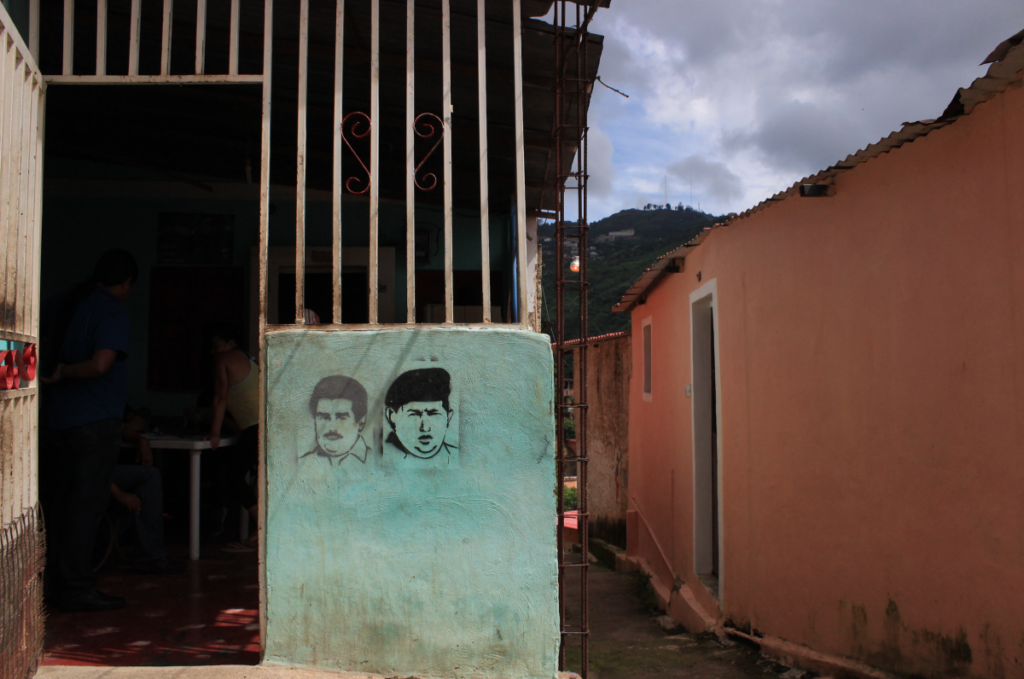
You have to look back to the days of Hugo Chávez to understand how Venezuela ended up a country where only 12 percent of people feel safe walking alone at night — lower than Iraq and Afghanistan. Chávez, simultaneously beloved and maligned, presided over the country for more than 14 years before succumbing to cancer in 2013. His death came just as oil prices, Venezuela’s main export, were near their peak. With proven oil reserves bigger than Saudi Arabia’s, the $100 (or just about) that every barrel generated helped create a waterfall of cash, which powered Chávez’s socialist-inspired experiment. But shortly after Chávez died, oil prices worldwide collapsed and the petrodollars dried up. His successor, current president Nicolás Maduro, has failed to find a way to keep the economy afloat. By continuing the socialist policies of his predecessor without the cushion of $100-a-barrel oil, he’s plunged the country into free fall.
During two weeks in Venezuela in late July, I watched the currency collapse from a rate of 7,600 bolívars per one U.S. dollar to just under 20,000. If you exchanged the equivalent of $1,000 into bolívars when president Maduro took power in 2013, that money would now be worth less than two bucks.
The financial downfall came hand-in-hand with political deterioration, which was about to culminate in the Constituyente of July 30. That day, Venezuelans were forced to watch 545 hand-picked Maduro loyalists, including the president’s own wife, usurp the country’s democratically elected parliament to form an all-powerful body named the Constituent Assembly. It can dissolve institutions, rewrite the constitution, and sic government troops against whomever it pleases. Its first order of business was to remove Attorney General Luisa Ortega Diáz, a former Chávez loyalist who’d turned sharply against Maduro in 2017.
On the ground, the vote left Venezuelans in shock. Deep down, many had believed that their government would never go through with the Constituyente. It seemed too risky: the domestic backlash would be overwhelming, and the international fallout could paralyze trade. For many of the young people I met, July 30 became the day they were finally forced to leave the only home they’d ever known.
Sofia
After Diego’s first personal brush with kidnapping the previous day, he was now bravely recounting the details of his escape to Sofia, our new passenger in the backseat.
“We call that express kidnapping, it’s really popular in Caracas!” says a giddy Sofia. She’s 27 years old, a former classmate and lifelong friend of Diego’s. Almost braggingly, she explains that her own father was kidnapped. “But he was driving a shitty company car, so they were like, ah fuck, we kidnapped a poor person!”
Her father was quickly released after the family paid a small fee. It was a pretty good kidnapping as far as these go, she says. Usually, an express kidnapping entails about 48 hours in captivity before the victim is ransomed back to their family for $5,000-$10,000. People in Caracas tend to describe crimes that don’t result in death or injury as “pretty good.”
Sofia and Diego met in high school and grew up as part of a tight-knit group of 12 friends. The boundlessly energetic Sofia works as a freelance graphic designer and comes from a comfortably middle-class home just minutes from Diego’s. Both grew up with money, and tease each other about what would happen if they got kidnapped together.
“When we drive at night, we joke to each other, like, if we get kidnapped, I’m telling them that Diego’s family has lots of money and they should take him!” giggles Sofia as she slaps Diego on the shoulder.
In a fit of laughter, Diego claps back. “No way! I would tell them that your family has a business and you have way more money so they should take you!”
This is the end of their time together in Caracas. In recent years, they’ve watched eight out of their 12 closest friends flee Venezuela for safety elsewhere. A ninth has finally made the decision to leave. And now Diego is looking into the paperwork to emigrate to Argentina. Despite losing the majority of her friends, Sofia is staying put for the time being, though she’s not exactly sure why.
“Every day my parents tell me to leave and I don’t know what keeps me here anymore. I hate talking about it. Honestly, I don’t know.”
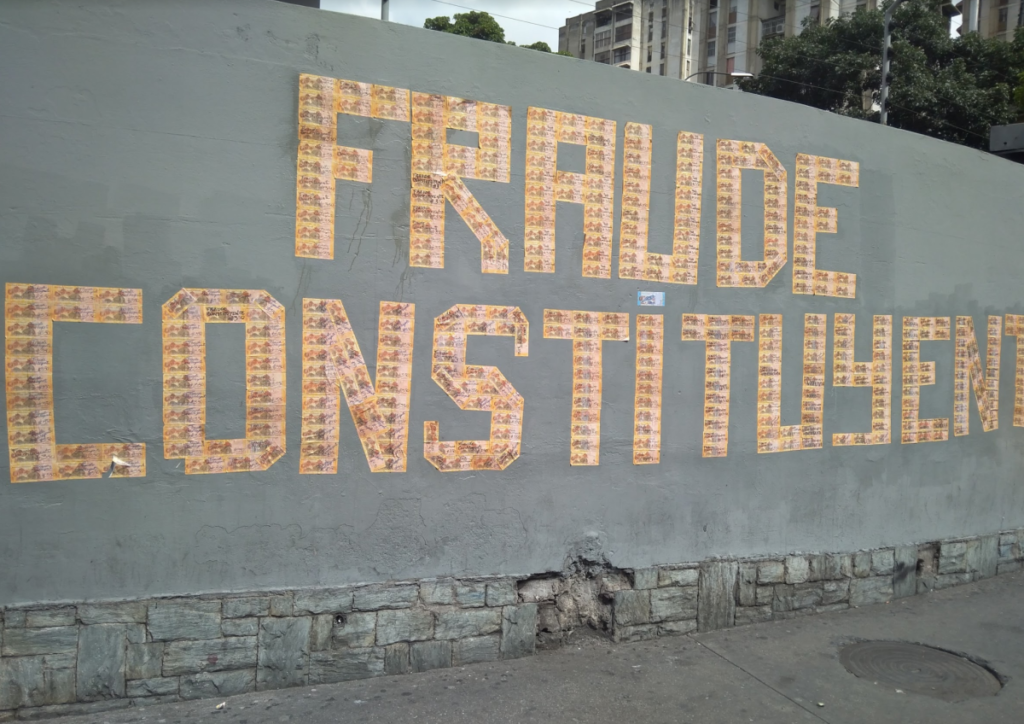
With the vote looming on Sunday, Diego and Sofia took me out for arepas at their favorite neighborhood spot on Thursday night. In days gone by, this is where they’d fill up on the Venezuelan staple after hitting the bars for a night of partying.
“This place used to be packed on Thursday nights,” Sofia laments as we take our seats in the near-empty restaurant. Right now it’s just us and a handful of other patrons scattered across a few dozen tables. The waiters, who outnumber the guests, pace around trying to look busy.
As recently as last December, Sofia was enjoying Christmas with her family on the beaches of Margarita Island, a vacation hotspot just a short flight from Caracas. Even then, despite the string of chaotic years that started in 2014, she says she couldn’t have imagined that things would get as bad as they are now. In the current atmosphere, her father has become so paranoid, he’s stockpiling supplies in preparation for civil war.
As we eat our arepas, Sofia jokes that I better get used to them, because I’m now stuck in Venezuela forever — in the previous two days, virtually all international airlines have suspended flights to Caracas. Deep down, Sofia genuinely fears that the weekend will be a catastrophe. She, like many others, expects that if the Constituyente goes through, there will be a massive uprising in the country.
“Cheers to the end of Venezuela on Sunday,” she hollers, raising her beer for a toast. “Fuck you, Chávez!”
When Diego debates whether to get another beer — tomorrow is a workday — Sofia eggs him on: “Why you worried about work? You’re gonna die on Sunday anyways.”
On the way home, we drop off Sofia and head back to Diego’s apartment in a hillside gated community. The 27-year-old still lives here, his childhood home, with his mom. His father, a lawyer, passed away not long ago. Despite holding down a full-time job as an accountant, he can’t afford to move out. The job barely pays him enough to afford food and basic essentials. Still, that puts him into the category of high earners at his age.
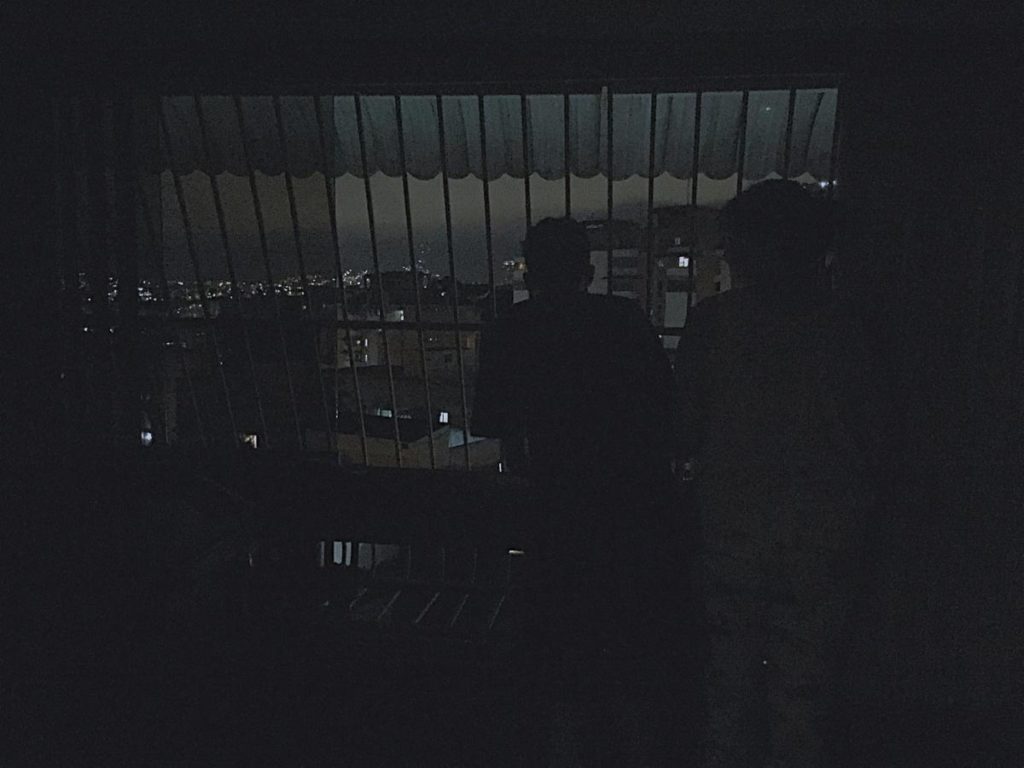
Diego and his mom look out over Caracas from their eighth-floor, caged-in balcony.
Sitting in the apartment that night, Diego and his mother receive notifications from their community Whatsapp group, the most popular form of organization in the country. The neighborhood will protest tonight, as it does most nights.
The two scurry for pots and cookware from the kitchen. As one neighbor blares the Venezuelan national anthem through loudspeakers, the pair bang their kitchenware together, creating a cacophony of sound inside the home. The entire neighborhood joins in, bringing an explosion of noise from every direction. From behind the steel bars enveloping their balcony, they look out over the surreal beauty of Caracas.
Carlos
Right next to Petare, Caracas’s largest barrio, sits a gated community of bungalows and small two-story homes. They look almost identical to those you’d find in any middle class American suburb. Surrounding it are dull-gray, Soviet-style high-rises, reminders of Venezuela’s close ties to Russia. On a nearby hill, the trademark huts of impoverished Latin American barrios overlook the gated community. From afar, these rows of tiny, dilapidated homes look like an orange staircase running up the mountainside.
This is where Dr. Carlos Sambrano lives. He’s a 25-year-old dentist working to become a maxillofacial surgeon, and over the phone he tells us his house will be easy to find.
“You’ll know. Just look for the one without a gate.”
He’s directed us to a cul-de-sac, at the end of which we spot a crew of construction workers standing outside a bungalow. Getting closer, we see them welding together thick steel bars.
Two nights earlier, on July 26, a squad of heavily armed officers from the anti-extortion and anti-kidnapping unit (CONAS) rode into the residential community in an armored personnel carrier, drove straight down the street, and rammed into the Sambranos’ gate. Behind the gate and off to the right, hiding in fear for his life next to a cement pillar, was Carlos.
He watched in terror as it only took two attempts for the APC to power its way through the heavy gate. Once inside, a CONAS operator opened fire, shooting eight live rounds into the home. The bullets blasted through the windows of his grandmother’s bedroom.
From inside the APC, one of the CONAS men spotted Carlos cowering behind the pillar. He stepped out and fired shots just above Carlos’s head.
He then grabbed Carlos and put a gun to his head. His father, now outside, yelled to the officer, “What are you doing! I’m a doctor, this is my house!”
In the blink of an eye, another CONAS officer kicked Carlos’s father to the ground and hovered his shotgun over his chest. Reflexively, Carlos moved to help his father, but as he shifted his weight, the CONAS officer repositioned his gun, pressing it into his neck.
At this point, Carlos knew why they were there. His crime was that he’d been out in Petare earlier that night giving medical aid to protesters who’d been wounded in clashes with the National Guard.
“The soldier said to me, ‘don’t you know we’re at war? Why are you out there helping them?’”
Closed-circuit cameras filming the Sambrano home were running the whole time and caught the terror unfold.
«This is Caracas, it’s not Baghdad or some place in Iraq, you know,” he says as we watch the tape. “It shouldn’t be happening here.”
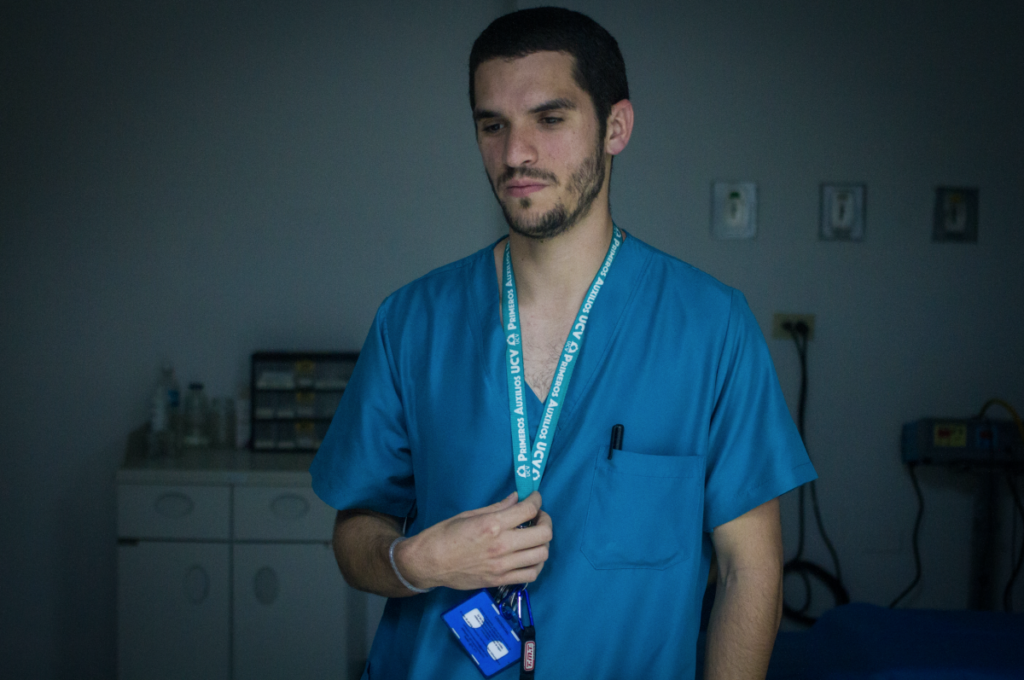
Carlos Sambrano working the late shift at a public hospital in the western Caracas barrio of Catia.
Having lived through a nightmare, Sambrano still considers himself lucky: at least he hadn’t been taken away. Disappearing had become all too common among government opponents and activists.
Later in the week, he tells me that his parents have had enough. After the raid, they decided it’s time for him to get out of the country.
His workplace — a public hospital in the barrio of Catia — is in disarray. A stray dog walks into the hospital, past a guard at the entrance, and no one pays it any attention. The dog passes us, walks down the poorly lit hallway, then strolls right on back where it came from, as if it were on patrol.
Carlos says he has nothing to give his patients apart from his time. Virtually no medicine, and few tools, are available. If someone comes in expecting treatment, they have to bring their own medication. If they can’t afford it, they have to gather the money somehow, or apply for government assistance, which can take months to be approved (if it’s approved at all).
“I’ve been to all the protests since 2014. It’s not working, it’s not solving anything. They’re just killing more people, and no one is doing anything about it. But on the other hand, this is a career I’ve always wanted and it would be really complicated to start it again in another country,” Carlos tells me. “But that’s what’s happening in this country, all the brilliant people, the brains, they are leaving.”
Gaucho
It’s Saturday, July 29, and we’re far away from Petare, in Altamira Square, an affluent section of downtown Caracas. More than anything, the young teenagers who call the square home dread disappearing. Belonging to a loose grouping of young frontline protesters nicknamed La Resistencia, the boys say their opposition has made them marked men for SEBIN, the Venezuelan intelligence agency.
Since April, SEBIN has been methodically rounding up protesters and activists. Those who get caught are locked away in El Helicoide, a massive, 25-acre prison complex that sticks out among Caracas’s mountainous landscape like a vision from a dystopian novel.
“I’ve been detained three times, but thank god I was underage, so they let me go,” says one tall boy in a ball cap and glasses. He stands out among the jumbled array of teenagers not just for his height, but for the respect the others give him.
“You can see the battle scars,” says the 16-year-old, nicknamed Gaucho, as he points out a variety of small marks on his body.
Gaucho is here almost every day, even though he works nearby as a waiter, studies in culinary school, and has a five-month-old baby. It takes him around an hour to trek to the square from his home in a Chavista stronghold outside Caracas. He lives there with his mother, a sanitation worker who goes so far as to lock him inside the home to prevent her boy from protesting.
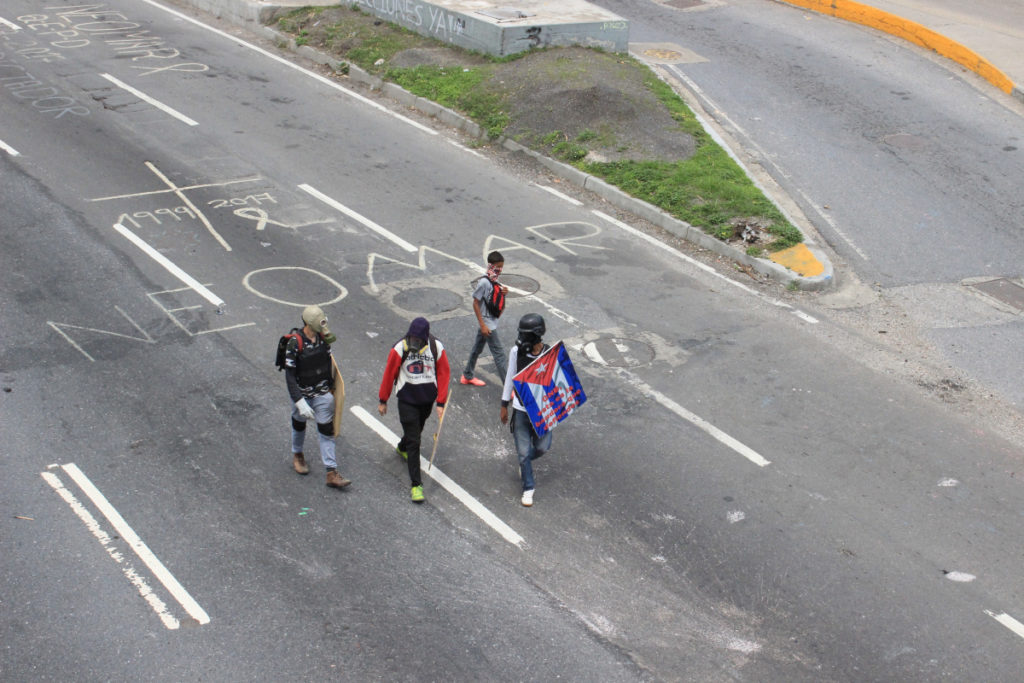
Protesters from the Resistencia movement walking on an empty Caracas highway.
As the day wears on, the makeshift blockades set up to surround the square are solidified, and more young people flock in for the fights. Some wear stopgap armor, including old gas masks and carpet vests. Most fight wearing nothing more than a T-shirt over their face.
With rocks, wires, rope, and garbage fires, they construct a flimsy fortress, trying to block every road in and out of the central square from the inevitable arrival of government forces.
Gaucho’s here because a single diaper for his kid can cost up to 4,000 bolívars. The 100,000 bolívars he brings in each month, working six days a week as an assistant cook, is barely enough to survive, even when combined with his mom’s salary. Neither qualifies for government food stamps because they both receive food at work.
Where he lives, outside Caracas, a packet of corn flour can cost 15,000 bolívars, or 15 percent of his monthly income. In Caracas, the same packet can be bought for 2,500. “The situation is way more critical outside this city,” says Gaucho, echoing what many others tell me that week.
On Saturday, toward the end of our second day in the square together, Gaucho emphatically answers no when I ask if he sees a future for himself, or his child, in this country.
“I was raised here, I love this country, but if we stay in this situation, there’s no future for me here. People have gotten tired of waiting in line for food, or getting killed for a single pack of bills.”
Before leaving him, Gaucho explains that if things don’t change in the coming days, he thinks the people will turn their guns against the cops. The next day, on July 30, while Gaucho was protesting in the nearby district of Chacao, activists set off an improvised explosive device among a convoy of officers on motorbikes. The IED left two guardsmen burning in the street near Altamira square, and wounded seven in total. That evening, as we rode past the charred remains of their motorbikes, a group of scrap salvagers were busily picking apart the pieces. Next to them, on a brick-walled portion of the Canadian embassy’s electrified perimeter, protesters graffitied the words Dictadura Tas Claro: it’s a dictatorship and you know it.
At least a dozen people had died in the four days leading up to the vote, and up to 14 more were killed on Sunday alone. The week had been the bloodiest stretch of one of the most vicious crackdowns in modern Venezuelan history.
Escobar
On Monday, July 31, Caraqueños awoke in a dead democracy, but they also started their day in a city that felt normal — or something approaching that — for the first time in months. The blockades were gone, cars took back the streets from protesters, and people returned to work.
That morning, in a sheepish attempt to rally the troops, opposition politicians took to Periscope and Twitter asking Venezuelans across the country to pull over in protest at noon. Virtually no one did.
The request prompted 31-year-old journalist and human-rights activist Melanio Escobar to sarcastically tweet, “last week they told us we’d be marching on the Presidential Palace by Friday, today they want us to turn off our cars at noon.”
In the courtyard of his apartment later that night, Melanio laughs when I ask about the opposition’s contrasting messages.
“Bro, these guys are just a joke sometimes,” says Escobar, whose punk-rock look sits in stark contrast to his jovial presence.
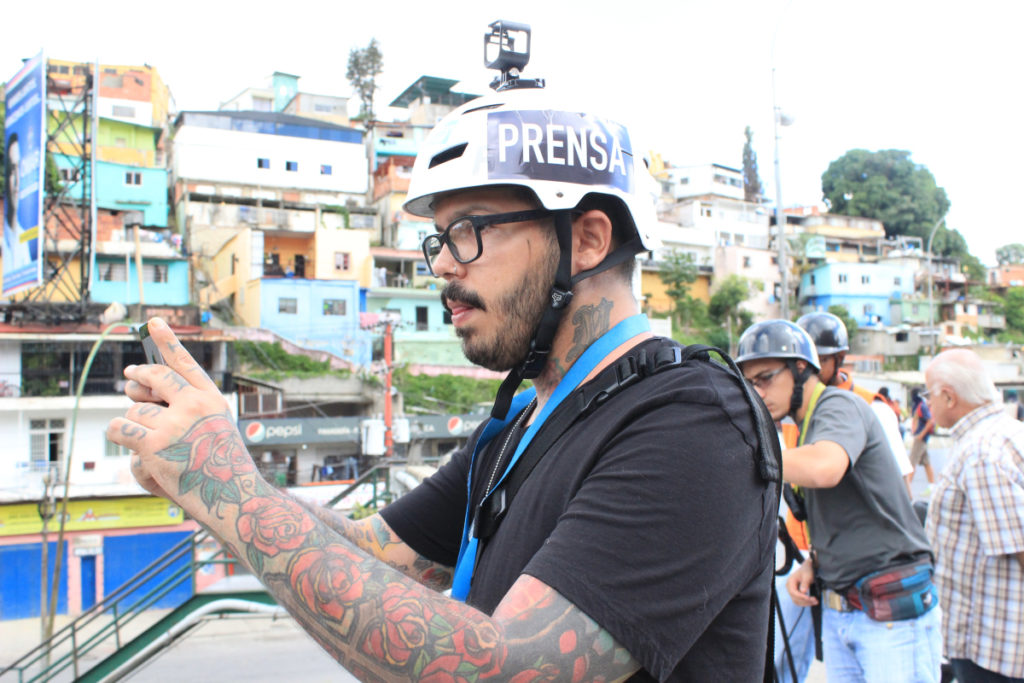
Journalist and human-rights activist Melanio Escobar, documenting the protests ahead of the July 30 vote.
By Monday night, the government had already declared Sunday’s vote a wild success, claiming that over 8,000,000 people had voted. Then the London-based, Venezuelan-owned company that manufactured the software used in the voting machines, Smartmatic, gave its own version of events, stating that not only was that number an unequivocal lie, but that they had proof the vote had been tampered with. Backing up the claims were scores of employees from state-run companies who divulged that they’d been pressured into voting. Their superiors had made the choice very clear: either vote on Sunday or don’t bother coming in on Monday. More ominously, NGOs and activists were revealing that the government had been withholding food disbursements until citizens showed proof they’d voted.
As the aftermath played out domestically, the United States, alongside most Latin American countries, came out against the vote and refused to recognize the results.
Escobar emerged from Caracas’s underground punk rock scene to become a respected independent journalist and the leader of a human-rights NGO (his good friend Miguel Pizarro, now the congressman representing Petare, is another veteran of the scene). The work puts a target on his back — so much so that, like Diego and Gaucho, he’s seriously considering restarting life elsewhere.
“But I don’t think it’s fair,” laments Escobar that night, “I mean, I’m not doing any harm to Venezuela, they are doing it, so why should I leave? It’s frustrating.”
Escobar has seen many of his friends flee, and adds that some of the girls he’s known for ages have even been forced to turn to prostitution to get by. For those who’ve stayed, the July 30 vote marked the end of their patience.
“I have so many friends who had their own red line. They would stay in the country until the Constituyente, but if the Constituyente went through, they said, then I’m gonna get the fuck out of here.”
Earlier in the week, Escobar had taken us across the city, methodically documenting the signs of protest and staggering poverty to his followers on Periscope. From hours-long lines outside grocery stores, to La Resistencia teenagers blockading the highways with burning garbage, Caracas was in a state of utter chaos.
Still, on that day, not only was he full of hope that the situation would soon get better, but he was certain the Constituyente wouldn’t pass.
“The Constituyente is too insane, even for this government,” he told me as we stood on a bridge overlooking an empty highway before a flock of over twenty National Guardsmen on motorbikes swarmed us to find out what Melanio, wearing a white PRESS helmet, was filming.
Now, after the vote, he can already see his own breaking point on the horizon.
“I don’t see myself picking up a gun.” Normally calm, Escobar stutters before pausing to gather himself. “You can see this gets to me,” he says before continuing. “What’s the point of fighting for this country if everyone is going to kill each other for food? It’s not worth it. It’s one thing to fight for democracy, but if we’re going to be cowboys on the street, killing each other just to get some bread, dude, it’s not worth it. Fuck the country, fuck your flat, fuck your patriotism, just get the fuck out of here.”
Federica
On Tuesday, two days after the July 30 vote, I meet up with Federica Davila, a 23-year-old medical student. We met for the first time during a protest on Sunday, where she was working with the Green Helmets, an organization she’d founded. The group of volunteer trauma medics has made headlines around the world, and has also endured the scorn of the government.
During a protest five weeks earlier, Federica broke her foot. While in the hospital, a young teenager who’d been shot in the chest was wheeled in only to die right next to her. Countless scenes like that convinced her to rip off her cast and get back to work on July 30. “It was too important to miss,” she tells me.
Federica’s parents have grown accustomed to seeing their daughter out in the nightmare. While they were terrified at first and begged her to stay home, her dad, a doctor himself, decided to join the Green Helmets after realizing how important their work was.
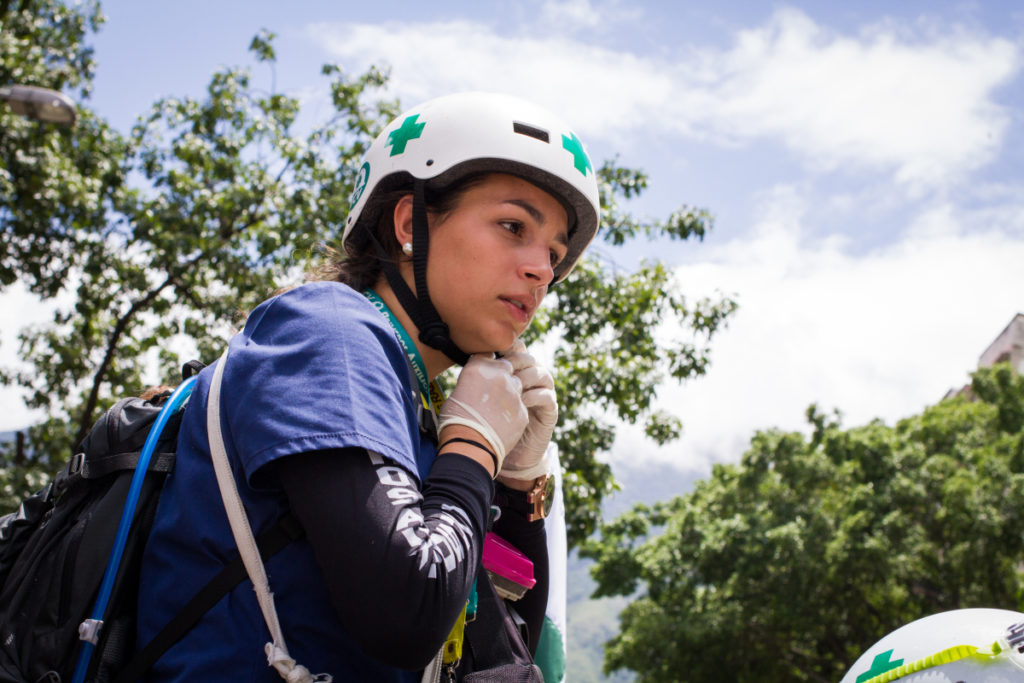
Federica, a medical student and founder of the Green Helmets, prepares to provide medical assistance to protesters.
“It’s very hard as a med student because you have constant contact with the people who are the poorest,” she says. “They go to the public hospitals that we work at because they can’t afford the private clinics, and you see people in their hardest times ever, starving for food. There’s no medicine, and it’s very hard to know that you could help this person, but you have no option, you have no medicine, no resources, no treatment.”
On this Tuesday, after five months juggling a gruelling schedule of medical school, hospital shifts, and protests, she’s taking a break to get her nails done. For those who’ve retained some of their wealth amidst the collapse, like Federica’s upper-middle-class family, small luxuries like the salon are still available.
Inside the salon, a small TV relays news of an arrest. Almost immediately, Federica and the two young women attending to her (who asked not to be named) crowd around her smartphone to watch a newly released video streaming on Twitter of Leopoldo Lopez, the face of Venezuela’s opposition, being taken from his home by SEBIN in the middle of the night. As they play it, the lights in the mall go out.
“Welcome to Venezuela,” quips Federica. “You’re living the whole experience. This happens often in the operating rooms too, and then they have to operate with their cell-phone lights. At my dad’s house, the lights go off once a day.“
The women discuss Sunday’s vote, and all three agree that it was fraudulent. One of the assistants, however, admits that she took part. She had to vote in order to get her CLAP bag, a colloquial term for the packages of cheap food and goods sold at government-subsidized prices. She relies on the affordability of CLAP bags to provide for her child. Without scolding her, her colleague asserts that she’d rather refuse the bag than participate in the fraud. She adds that one of her friends was just fired from his job at a state-run company for refusing to take part in the vote.
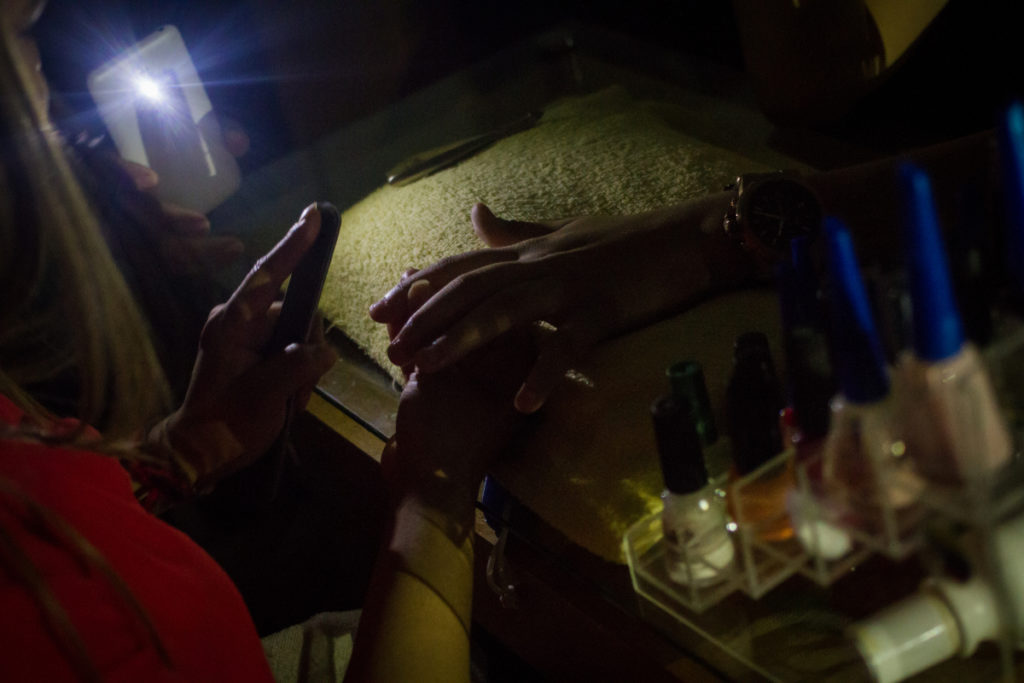
In a Caracas mall, cell-phone light helps spa workers finish a manicure during a power outage.
Affording food isn’t a problem for Federica. Her splurge today will cost her a little over 250,000 bolívars — more than twice the minimum wage that each of these workers earns per month.
After finishing her manicure under the aid of cell-phone lights, Federica suggests we grab a meal at the food court downstairs. There, a handful of restaurants are open and serving a scant few customers. When we take our seats, the waiter who serves us studies Federica’s face for a minute before offering his hand.
He tells her that he knows who she is and wants to thank her for the work she does, because he knows all about it first-hand. Recently, he was shot with a rubber bullet while protesting in the streets. He looks around before discreetly unbuttoning the top portion of his dress shirt to reveal a dime-sized wound.
“I became a protester because I have two kids and I don’t want to stand in lines for food anymore,” he tells us when I ask what spurred him into the streets, “and I don’t want to constantly watch over my back for SEBIN.”
I join Federica later that night at a party in a gated apartment complex in Caracas. Here, the booze flows freely and the liquored-up guests are all in good spirits, but they all also want out of the country.
One 35-year-old engineer, a Green Helmets volunteer who evacuated wounded protesters on his motorcycle, says that his life here is over. He’s got a wife, a kid, and the money to leave, and now it’s time.
The young med students, some of them not even 20, all tell me their plan is to get out too. It reminds me of something that Dr. Jose Manuel Olivares, a young doctor-turned-congressman, had told me earlier in the week. Out of 87 people in his med-school graduating class, only five were left in Venezuela; he was the only one still working in a public hospital.
Diego
Following the vote on July 30, the opposition tried to hold a vigil for the protesters who had died across the country on Sunday. The small gathering was quickly dispersed with tear gas.
And that was it for the protests. The movement that started in April had died, alongside some 120 or so Venezuelans. Countless more were now wounded for life, while others had vanished or been locked up. President Maduro had not only kept power, but increased it. Weeks later, the city remains quiet.
On my last night in Venezuela, Diego and I go for beers at his favorite bar in Caracas. The night air is cool, as it always seems to be here, and the bar plays a succession of 2000s rock songs. For once, a nightspot is pretty full.
The young man who just last week was a fervent protester is now totally deflated. He’s removed himself from all his protest groups on Whatsapp. “I can’t stand to see the people posting ‘we still have hope’ in those groups,” he tells me as he sips a blue bottle of Solera Light, his beer of choice. He jokes that it’s 2,000 bolívars but by the time we get the bill, it might be 4,000.
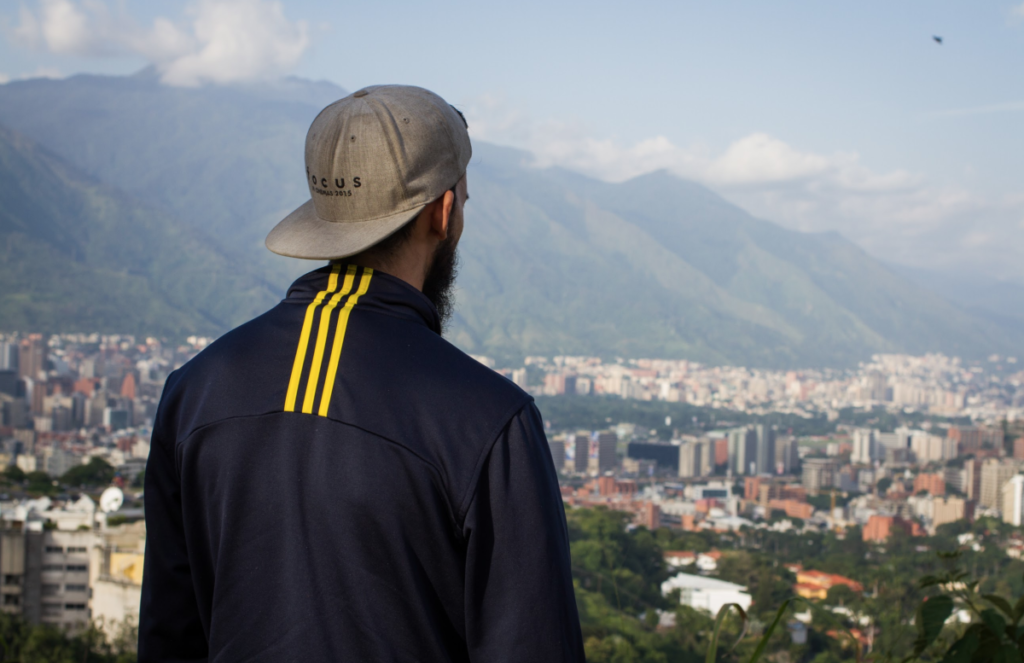
Diego, born and raised in Caracas, looks out over the landscape of his hometown.
Yesterday, he booked a flight to Argentina for September, to start a new life. Diego tells me he’s worried about Sofia. After he leaves, she’ll be the only one left. “I can’t understand why she’ll stay,” he says, “she was the first to propose leaving.”
In Argentina, Diego will probably try to find quick work as a waiter to start bringing in some money right away. His goal is to go into the hotel business, and he’s got a good shot. As a former accountant who speaks fluent English and Portuguese — a huge plus, as Argentina gets lots of tourists from Brazil — he should do fine.
Driving home from the bar, Diego opens a beer. “It’s okay, there are bigger problems here now,” he jokes as we rip through the empty streets. We see a small group of die-hard protesters guarding the entrance to the highway and trying to block it off. As we drive past, he yells in anger, “oh come on, give it up, Maduro is going to be here forever!”
It’s the first time I hear Diego accept what, for others, has already been a foregone conclusion: there was no way out of this mess that didn’t involve leaving Venezuela. Between the hopeless downward spiral that the country has become and rebuilding his life from scratch, he chose to try his luck elsewhere.
***
Christian Borys is a Canadian journalist who’s written for BBC News, CBC, The Washington Post, The Daily Beast, and others. He tweets @ItsBorys.
***
Editor: Ben Huberman
Photography: Daniel Blanco and Christian Borys
Fact-checker: Matt Giles
